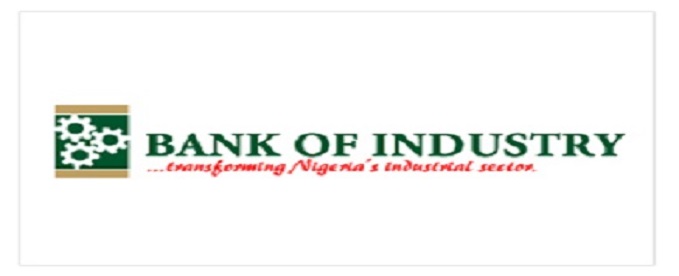E-Financial
BoI Increases Support to N53Bn

BoI Increases Support for MSMEs to N53Bnthe Bank of Industry (BoI) has disclosed that it made a total disbursement of N53 billion to micro, small and medium scale enterprises (MSMEs) in 2019, in demonstration of its commitment to the development the segment in the country.

This was a 56.3 per cent year-on-year increase from the N33.9 billion disbursed in 2018.
This was announced at the Bank’s 60th Annual General Meeting held virtually in line with COVID-19 protocols of the federal government.
During the year under review, the BoI stated that it disbursed a total of N234 billion to a total 10,145 enterprises, thereby facilitating the creation of an estimated one million direct and indirect jobs.
Presenting the Group’s financial scorecard for the year 2019, Mr. Aliyu Abdulrahman Dikko, chairman, Board of Directors, stated “I am also pleased to report that the group’s balance sheet remains strong while our business operations are in line with both regulatory requirements and global best practices.”
According to him, the Group grew its total equity by 13.5 per cent to N293.09 billion for the year ended 2019, over 2018 position of N258.24 billion.
However, he noted, the group’s total asset dropped slightly by 2.7 per cent to N1.04 trillion.
The Group also recorded profit before tax increase by 7.3 per cent to N39.34 billion year-on-year, over the N36.66 billion recorded in 2018.
On loans and advances, the Chairman said that despite a slow start in the first quarter of the year due to the build-up to the 2019 general elections, the Group recorded a growth of 16.7 per cent, from N634.11 billion in 2018 to N740.03 billion in 2019.
Interest income and interest expense increased by 20 per cent and 54 per cent on a year-on-year basis respectively, due to increase in loan book as well as the impact of borrowings.
He said, “in the course of the year, we made significant progress towards improving the size of our loanable funds, leveraging our strategic partnerships in the international market and the support of the Central Bank of Nigeria. The Bank was able to raise €1 billion (One Billion Euro) through syndication by international banks for onlending to SMES to create jobs.”
Mr. Kayode Pitan, managing director of BoI, described the year under review, which marked the 60th anniversary of Nigeria’s oldest Development Financial Institution, as a significant year for the Bank.
“As a Bank, we have survived 60 years and by God’s Grace, the Bank has done very well,” he said. “The balance sheet of the Bank, after 60 years, is now slightly over one trillion Naira; and the profit for last year was also very good.”
Beyond the profit, he said, the Bank made strong impact on the economy by disbursing over N200 billion in 2019 to over 10, 000 different institutions and organizations, including the about 60 per cent increase in disbursement to the SME segment.
“So for us, it was a good year,” he stressed.
E-Financial
FCMB Partners Truecaller to Reinforce Customer Communication, Trust

First City Monument Bank (FCMB), one of Nigeria’s leading and most innovative customer-centric financial institutions, has announced a strategic partnership with Truecaller, the global platform for trusted communication, to transform the way it engages with customers across the country.

This collaboration is aimed at enhancing customer trust, reducing fraud, and ensuring that communication between FCMB and its customers is both safe, trusted, and seamless. With this partnership, FCMB will leverage Truecaller’s Customer Experience Solution and Branded Caller ID to ensure their customers receive transaction alerts, security notifications, and service updates with complete clarity and trust.
All FCMB calls will now display the bank’s verified name, logo, and brand details directly on customers’ mobile screens. This initiative reinforces FCMB’s strong commitment to digital safety, privacy, and customer trust. In today’s financial landscape, where impersonation and fraud are becoming increasingly sophisticated, Truecaller’s Customer Experience Solution is more than just a convenience — it is a vital safeguard for protecting customer relationships and enhancing confidence in every interaction.
In addition to smarter calling experience, FCMB has also activated its Business Page on the Truecaller app. This ensures that customers can independently discover, recognize, and engage with FCMB directly within the Truecaller app, reinforcing trust before the first point of contact is even made.
Together, these capabilities are helping FCMB strengthen its digital identity, reduce customer drop-offs, and improve the overall efficiency and credibility of its outbound communication efforts. Assured Authenticity: Customers can now instantly identify that calls from FCMB are genuine – reducing the risk of phishing or impersonation scams.
Enhanced Experience: Verified Business Caller ID brings clarity and eliminates uncertainty, particularly during critical communications such as security alerts or service updates.
Reinforced Trust: By adopting industry-leading communication capabilities, FCMB reaffirms its promise to protect customers with care, transparency, and innovation. Chief Information Officer at FCMB, Rotimi Famuwagun said: “At FCMB, our customers are at the heart of every innovation.
Through our partnership with Truecaller, we are strengthening communication security and fostering greater trust. When customers see the verified FCMB name along with our brand identity on incoming calls, they can be assured of transparency, authenticity, and care behind every interaction.’’
Priyam Bose, Global Head, GTM & Developer Products at Truecaller, shared: “At Truecaller, our goal is to help brands build meaningful, secure, and transparent communication at scale — especially in sectors like financial services where trust is everything.
“FCMB’s commitment to customer safety and trusted communication by embracing Truecaller Customer Experience Solution, FCMB is setting a new bar for what responsible, modern customer communication should look like — and we’re excited to support them on this journey.
E-Financial
Don’t Spray, Mutilate Naira – CBN

Central Bank of Nigeria (CBN) has warned Nigerians, especially market women, against spraying, hawking and mutilating of the naira, the nation’s national currency.

Olayemi Cardoso, governor, CBN, who was represented by Mrs Hakama Sidi Ali, acting director, Corporate Communications Department, CBN, spoke at the Central Bank Fair, held in Kaduna on Thursday.
He said the Fair was designed as a platform to interact with members of the public on the policies of the CBN for sustainable economic growth and development of the country.
The Fair was themed “Driving Alternative Payment Channels as Tools for Financial Inclusion, Growth and Accelerated Economic Development”.
The CBN boss said the theme was carefully chosen to address the links that catalyse Small and Medium Enterprises (SMEs) and other critical activities for the much-needed price stability.
“I urge everyone here to rely only on information disseminated through the verifiable official channels of the Central Bank of Nigeria. I also encourage you to respect and keep the naira clean. Do not spray, hawk, mutilate or counterfeit the naira. It is our critical national symbol.
“The core objective of this engagement, therefore, is to sensitise members of the public on how the Bank’s policies enhance their lives and livelihood and contribute to the growth and development of the Nigerian economy.
“Our dedicated team is on hand to take us through presentations on different operations of the Bank, ranging from the recent innovations in the Nigerian payments system; microfinance sub-sector activities; developments in the foreign exchange market, protection of financial consumers and all you need to know about the naira.
“The Management of the Bank is committed to stimulating productivity and financial inclusiveness, as well as delivering on its core mandate of monetary and price stability.
“These efforts have already started yielding positive results, which include increases of inflows of foreign investments, positive trade balances and remarkable progress in financial inclusion.
“The CBN has spearheaded several key policies to strengthen the financial system which includes exchange rate unification; to minimise arbitrage opportunities and reduce volatility in the foreign exchange market and cleared over $7bn verified backlog of FX forwards.
“It also include Bank Recapitalisation; to strengthen the resilience and global competitiveness of the banking sector, positioning it to support the $1 trillion economy, launched the non-resident BVN to connect Nigerians abroad with home banking, unveiled the Nigeria Payments System Vision 2028 (PSV 2028); to accelerate digital transformation, deepen financial inclusion, and position Nigeria more strongly in global payments.
“To further protect banks’ customers and strengthen consumer confidence, the CBN launched the Unified Complaints Tracking System (UCTS) to streamline the management of consumer complaints against financial institutions. Alongside this, USSD code (*959#) was also introduced for verifying licensed institutions, and enhancing transparency in the Nigerian financial sector,” Governor Cardoso said.
Speaking earlier, Ahmad Dalhatu, Kaduna branch Controller of CBN, reaffirmed that the CBN Fair is one of the Bank’s major public enlightenment initiatives aimed at sensitising members of the public on the Bank’s policies, programmes, and interventions.
“It serves as a platform to deepen financial literacy, promote transparency, and strengthen trust between the Bank and the Nigerian people.
“Over the years, the Fair has evolved into a veritable channel for fostering two-way communication between the Central Bank and the Nigerian public. It enables us not only to explain our policies but also to listen to your concerns, feedback, and expectations. This year’s event continues in that tradition, and I encourage everyone here to actively participate in the discussions.
“As we navigate the evolving economic landscape—both globally and locally—the need for increased public awareness of monetary policy, financial inclusion, consumer protection, digital payments, and intervention programmes cannot be overemphasised. The CBN remains committed to ensuring a sound financial system and an inclusive economy where every Nigerian can thrive,” Dalhatu said.
E-Financial
Fidelity Bank Extends GAIM 6 Promo, Boosts Total Cash Rewards to ₦189m

Fidelity Bank has announced a three-month extension of its Get Alert in Millions (GAIM) Season 6 promo, now running until November 30, 2025, with total cash rewards increased from ₦159 million to ₦189 million.

L-R: Direct Sales Executive, Fidelity Bank Plc, Adegboyega Ademokunwa; GAIM 6 Eight Monthly draw Winner, Innocent Okoro Orji; Branch Leader, Fidelity Bank Plc, Gbagada, Chinwe Umez-Eronini; and Product Manager, Savings, Fidelity Bank Plc, at the GAIM 6 prize presentation ceremony held at Gbagada Building Materials market in Lagos recently.
This move follows strong customer demand for more participation time and has received full regulatory approval.
Originally launched in November 2024 for nine months, the GAIM 6 campaign was set to end in August 2025. However, based on customer feedback, the bank extended the promo to allow more Nigerians to benefit.
Recently, the bank celebrated 20 winners nationwide, each receiving ₦1 million through electronically supervised draws overseen by the Federal Competition and Consumer Protection Commission (FCCPC) to ensure fairness.
With over ₦30 million still up for grabs in upcoming monthly draws, the final prizes include ₦2 million for second runner-up, ₦5 million for first runner-up, and a ₦10 million grand prize. Recipients also gain access to financial advisory support at the Fidelity SME Hub to help maximize their rewards.
Fidelity Bank serves over 9.1 million customers through digital channels and 255 branches, earning various awards for innovation, digital transformation, and SME banking excellence.
The bank continues to promote savings culture and financial empowerment across Nigeria through initiatives like GAIM.

 E-Business2 days ago
E-Business2 days agoMicrosoft Seizes 340 Websites Linked to Nigerian-based Phishing Subscription Service

 Broadcasting2 days ago
Broadcasting2 days agoMultiChoice Starts Reorganising Operations to Enable Canal Plus Takeover

 Telecom2 days ago
Telecom2 days agoMTN in Talks with Global Partners to Build AI Data Centers Across Africa

 Telecom2 days ago
Telecom2 days agoGalaxy Backbone Achieves ISO Recertification Across Four Key Standards, Boosting Trust, Resilience

 E-Financial2 days ago
E-Financial2 days agoFG’s New Tax ID Could Frustrate Financial Inclusion Efforts- Omoyele

 E-Financial2 days ago
E-Financial2 days agoCBN Directs Banks to Announce CEO Three Months Before Exit of Outgoing One

 News2 days ago
News2 days agoOmoyele Sowore Sues DSS, Meta, and X Over Alleged Unconstitutional Censorship

 News2 days ago
News2 days agoNigeria’s NIN Enrollment Hits Record 126m



























